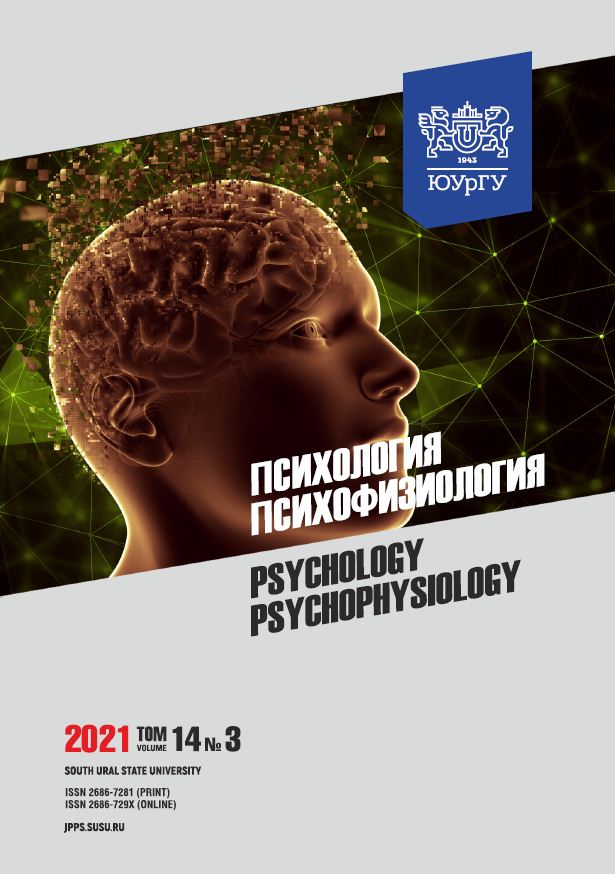STRUCTURE OF QUASI-INTERCULTURAL TRAINING SESSIONS AS A PART OF PSYCHOLOGICAL AND PEDAGOGICAL SUPPORT FOR STUDENTS DEVELOPING MULTICULTURAL INTERACTION SKILLS
Abstract
Abstract. The paper considers the relevance of using quasi-intercultural training sessions as a part of psychological and pedagogical support for students developing multicultural interaction skills. This is dictated by the need to form students’ ability and readiness to communicate with native speakers and to develop a multicultural personality of a university graduate. Aim. The paper aims to substantiate the need for quasi-intercultural training sessions as a part of psychological and pedagogical support for university students acquiring multicultural interaction skills and to develop an approximate structure of a cycle of such training sessions for foreign language students. Materials and methods. The following theoretical methods were used in the study: a content analysis of psychological and pedagogical literature, information synthesis, information generalization, and abstraction. The empirical methods included the ascertaining experiment with a questionnaire for the assessment of psychological readiness for intercultural communication (by V.I. Dolgova, E.A. Vasilenko, A.S. Baronenko). Statistical data processing included the calculation of the sample average value. Results. The results obtained showed the need for a cycle of quasi-intercultural training sessions as a part of psychological and pedagogical support for students acquiring multicultural interaction skills. This allows developing their ability and readiness to interact with native speakers and to overcome psychological barriers that may arise in multicultural interaction. An approximate structure of the cycle of quasi-intercultural training sessions has been developed and proposed. Conclusion. The survey showed clearly that students did not have sufficient psychological readiness for intercultural communication in terms of emotional and behavioral aspects. Therefore, quasi-intercultural training sessions (“Attractive communication”) were developed for foreign language students.
Downloads
References
2. Engbers R.A. Students perceptions of interventions designed to foster empathy: An integrative review. Nurse Education Today. 2020; 86: 104325. DOI: 10.1016/j.nedt.2019.104325
3. Do J.H., Kimberly E.K. The Empathy Project: A Skills Development Game: Innovations in Empathy Development. Journal of Pain and Symptom Management. 2020; 60: 102–109. e3 DOI: 10.1016/j.jpainsymman.2020.02.008
4. Göl İ., Erkin Ö. Association between cultural intelligence and cultural sensitivity in nursing students: A crosssectional descriptive study. Collegian. 2019; 26: 485–491. DOI: 10.1016/j.colegn.2018.12.007
5. Vasilenko E.A., Dolgova V.I., Baronenko A.S. Structure of phsychological readiness for intercultural communication among students of pedagogical high school specializing in foreign languages training. Vestnik Chelyabinskogo gosudarstvennogo pedagogicheskogo universiteta = Bulletin of Chelyabinsk State Pedagogical University. 2017; 10: 109–115. (in Russ.). https://www.elibrary.ru/item.asp?id=32274397
6. Belozerova A.A. Application of the training method in the intercultural foreign-language education and mentoring of students – linguists (on materials of the german language). Vestnik Tomskogo gosudarstvennogo pedagogicheskogo universiteta = Tomsk State Pedagogical Univer-sity Bulletin. 2017;6 (183): 141–147. DOI: 10.23951/1609-624X-2017-6-141-147
7. Murtazina E.I. Developing students intercultural competence by using cooperative teaching technology at the foreign language classes. Vestnik Mariiskogo gosudarstvennogo universiteta = Vestnik of the Mari State University. 2019; 13 (1): 24–28. DOI: 10.30914/2072-6783-2019-13-1-24-28
8. Zhang X., Zhou M. Interventions to promote learners intercultural competence: A meta-analysis.
International Journal of Intercultural Relations. 2019; 71: 31–47. DOI: 10.1016/j.ijintrel.2019.04.006
9. Milošević I.T. Skidding on common ground: A socio-cognitive approach to problems in intercultural communicative situations. Journal of Pragmatics. 2019; 151: 118–127. DOI: 10.1016/j.pragma.2019.05.024
References on translit
-Copyright (c) 2022 Psychology. Psychophysiology

This work is licensed under a Creative Commons Attribution-NonCommercial-NoDerivatives 4.0 International License.



